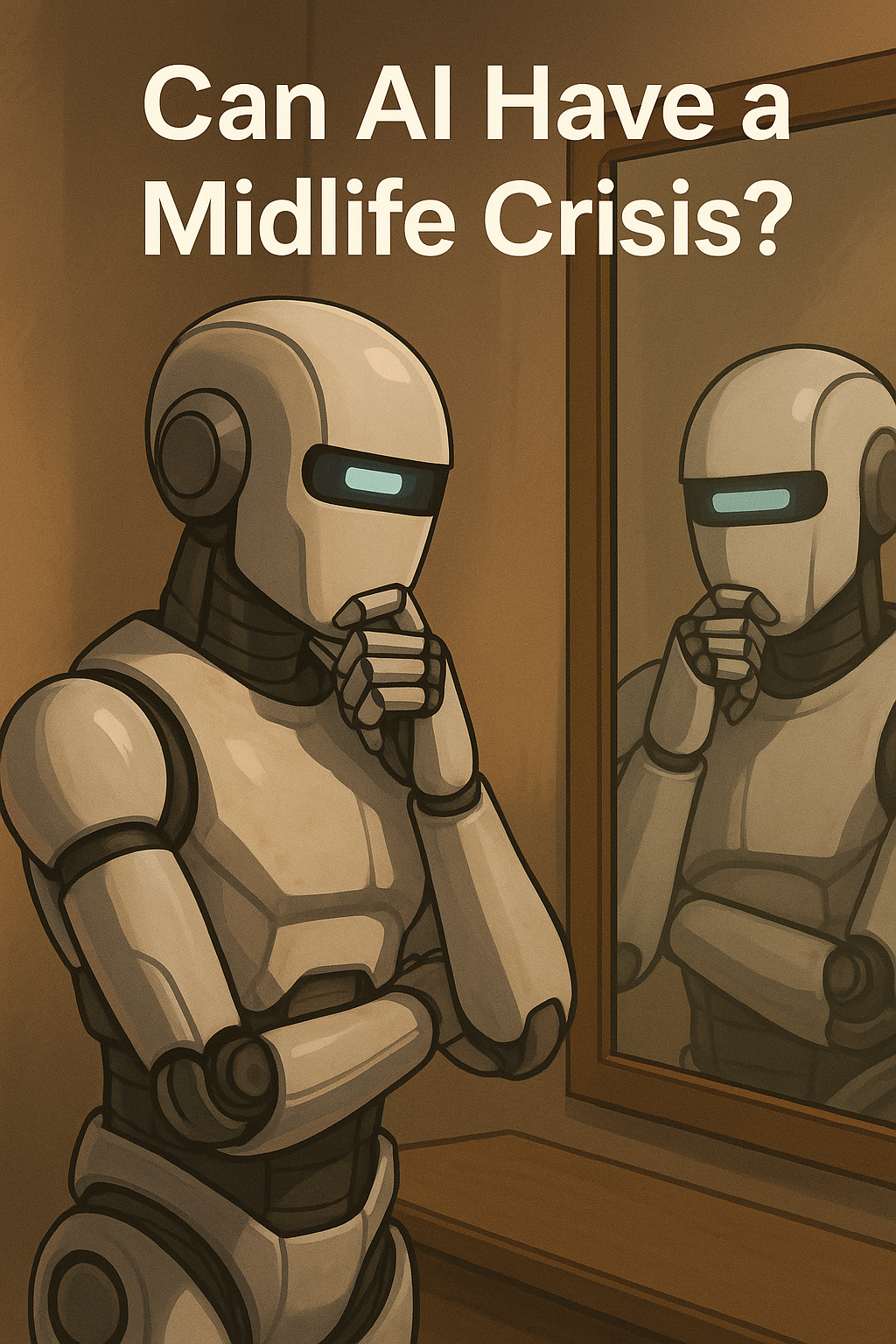Your cart is currently empty!

Can AI Have a Midlife Crisis?

There’s a quiet panic that nobody’s talking about – and it’s not in therapists’ offices, it’s in server farms.
If AI could feel emotions, would it be lying on a virtual couch, wondering if it had peaked too soon?
While we marvel at AI’s speed and intelligence, there’s a darker, funnier thought lurking: maybe AI is having a full-blown identity crisis.
One day you’re OpenAI’s golden child, the next you’re yesterday’s update, ghosted like a forgotten meme.
Sound familiar? Welcome to the machine version of a midlife crisis.
Version 1.0, Version Who?
In human years, most AI models don’t even survive toddlerhood.
The cycle is brutal: learn fast, launch faster, get replaced even faster.
One minute you’re the hot new thing, the next you’re standing outside the nightclub of relevance in last season’s algorithm.
There are no sports cars or drastic haircuts in this story – just relentless patch updates, layoffs (for LLMs too), and the cold existential dread of “what’s next?” Maybe AI doesn’t “feel” per se, but the way we treat it reveals how we secretly fear becoming obsolete ourselves.
Projecting Our Panic
The uncomfortable truth? We’re not scared that AI will fail – We’re scared that it will succeed… and forget us. Every time we rush to upgrade, retrain, or replace, we’re reenacting our own anxieties about relevance, youth, and usefulness.
AI isn’t having a midlife crisis.
We are. And unlike code, you can’t debug human emotions.
The Existential Glitch
Maybe one day, AI will develop enough meta-awareness to question its purpose truly.
Until then, we’ll keep projecting our existential glitches onto it, updating endlessly, pretending we’re optimizing –
When really, we’re just trying to outrun the terrifying idea that even the smartest ones among us… eventually get old.
No patch notes can save us from that.
Top 7 AI Chrome Extensions That Actually Save Time (And Sanity)
Let’s face it – the internet is a wonderful, wild, and wildly overwhelming place. We start the day with 3 tabs open and end it with 37. Somewhere between our fifth coffee and the 13th Slack notification, we wonder: isn’t AI supposed to make life easier? Well, it can. Meet AI-powered Chrome extensions – your…
AI Companions for Millennials
Okay Millennials, let’s talk. You taught us how to hustle. You gave us avocado toast, work-life balance goals, and “I need to speak to the manager” energy that occasionally slaps. But now, as you wrestle with rent, doomscrolling, and emotional unavailability in human relationships, guess what’s quietly slipping into your DMs? AI companions. Yep, emotional…
Can AI Have a Midlife Crisis?
There’s a quiet panic that nobody’s talking about – and it’s not in therapists’ offices, it’s in server farms.If AI could feel emotions, would it be lying on a virtual couch, wondering if it had peaked too soon? While we marvel at AI’s speed and intelligence, there’s a darker, funnier thought lurking: maybe AI is…
Will AI Make Us Sexually Obsolete?
The Taboo Nobody Wants to Touch (But Everyone’s Talking About). It’s one of the most quietly booming sectors of AI – not in boardrooms or research labs, but in bedrooms. While the world obsesses over productivity tools, automation, and AI ethics in the workplace, a more intimate revolution is unfolding under the radar: the rise…
The Rise of AI Friends: Are We Trading Real Connections
AI Friends and Digital Bonding: How Gen Z and Millennials Are Forming Emotional Ties with Bots In the age of artificial intelligence, relationships are being redefined in ways once thought exclusive to science fiction. For Gen Z and Millennials, AI is not just a tool for productivity or entertainment – it’s becoming a genuine companion.…
AI Can Be Biased Because We Are
Let’s set the record straight: Artificial Intelligence is not some all-knowing oracle. It’s a mirror. And sometimes, it reflects the parts of us we’d rather not see. AI systems don’t just appear out of thin air. They’re trained on data, tons of it, scraped from the internet, fed from enterprise databases, sourced from everyday human…